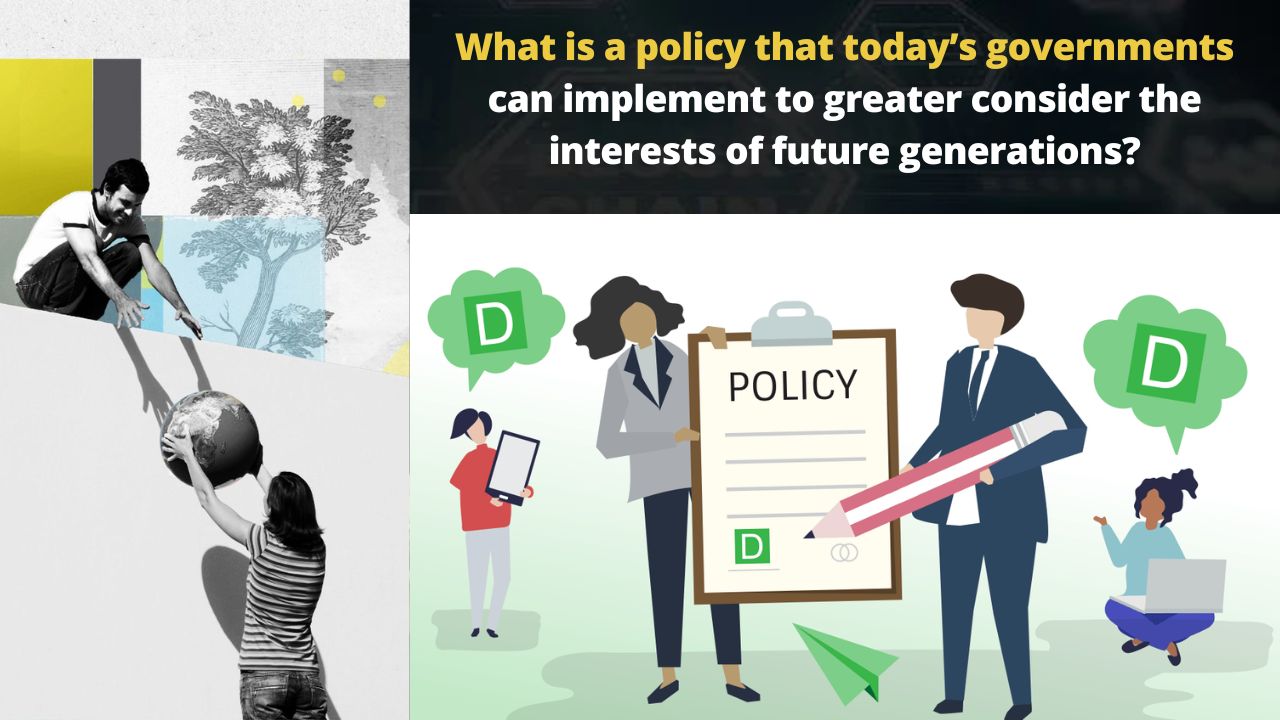What is a policy that today’s governments can implement to greater consider the interests of future generations?
Hello My Dear Friend, In this post “What is a policy that today’s governments can implement to greater consider the interests of future generations?“,
We will be going to read about the Policies that today’s governments can implement to consider the interests of future generations in detail. So…
Let’s Start…
Introduction
The duties of governments go well beyond meeting the immediate needs of their people in a time of fast technological advancement and global connectivity.
The creation and execution of policies that effectively meet the interests and well-being of future generations is currently a serious topic for policymakers.
It is crucial to take a long-term perspective that goes beyond immediate benefits as the globe struggles to address issues like climate change, resource depletion, and socioeconomic inequality.
The development of sustainable intergenerational policies, which make sure that the decisions made by today’s governments have a positive impact for decades to come, is one workable option.
Understanding the Challenge
Traditionally, it has been the responsibility of governments to take care of the current requirements of their citizens.
However, as societies develop, the effects of present policies may have long-lasting effects that lower the standard of living for coming generations.
The idea of sustainable intergenerational policy emphasizes the significance of making decisions that protect the long-term interests of future people by acknowledging this interconnectedness between the present and the future.
The Principle of Intergenerational Equity
The intergenerational equality concept, which holds that the current generation has a moral duty to leave behind a world and society that are as prosperous and viable as those inherited, is at the core of sustainable intergenerational policies.
This principle emphasizes the idea that environmental degradation should be kept to a minimum in order to ensure that future generations inherit a planet that is habitable and that resources should be managed carefully to prevent their depletion.
Policy Recommendations
1. Long-Term Environmental Stewardship:
Governments can put in place regulations that put sustainable resource management and environmental preservation first.
This entails putting money into clean energy projects, enforcing strict emission limits, and protecting biodiversity.
Governments can guarantee that the ecological balance is maintained in this way, leaving behind a clean and healthy environment for future generations.
2. Education for Sustainable Development:
Long-term well-being depends on cultivating informed, ecologically conscientious citizens.
Governments should incorporate thorough education on sustainability into all levels of curricula so that people have the knowledge and abilities to make decisions that are good for them and future generations.
3. Ethical Fiscal Responsibility:
The fiscal decisions made today could have a significant impact on coming generations. Governments should use caution when it comes to borrowing and spending, avoiding going overboard and perhaps burdening future taxpayers.
Transparent fiscal planning makes sure that governments maintain their financial stability and do not jeopardize the future economic opportunities of their citizens.
4. Social Safety Nets and Equality:
Addressing inequality and social welfare issues is a necessary step in creating a just society.
Governments ought to give top priority to measures that encourage equal access to opportunities in the fields of education, health care, and employment.
Governments can enable future generations to succeed without unnecessary obstacles by leveling the playing field.
5. Investment in Research and Innovation:
Technological developments have the power to significantly influence the future. In order to address new difficulties, governments should spend money on research and innovation in a range of industries, including healthcare and energy.
In addition to promoting economic progress, this gives the next generation the resources they need to solve challenging issues.
6. Climate Change Mitigation and Adaptation:
One of the most important issues facing future generations is climate change. Governments must act quickly to cut greenhouse gas emissions, switch to renewable energy sources, and put adaptation plans in place in response to the changing climate.
In this aspect, international cooperation is essential since global problems demand global solutions.
7. Transparent and Inclusive Governance:
Accountability and openness are improved when citizens are involved in the policymaking process.
Governments should use participatory strategies that include a range of voices, including those of children and youth. This makes sure that the needs and ambitions of the future generations who will be affected by the policies are met.
Conclusion
The decisions made by today’s governments have the potential to influence future generations’ quality of life in a globally interconnected society.
Governments can protect the welfare of future populations by implementing sustainable intergenerational policies that are based on intergenerational equality principles.
The way forward requires a concerted effort to balance immediate benefits with long-term goals, whether through environmental stewardship, educational empowerment, fiscal responsibility, social equality, technological innovation, climate change mitigation, or inclusive governance.
The decisions we make now, as we stand at the fork in the road of time, will define our legacy as stewards of a shared world.
Finally, Thanks For Reading “What is a policy that today’s governments can implement to greater consider the interests of future generations?“.
If you have any questions related to “What is a policy that today’s governments can implement to greater consider the interests of future generations?“, So, please comment below.
Must Read:
